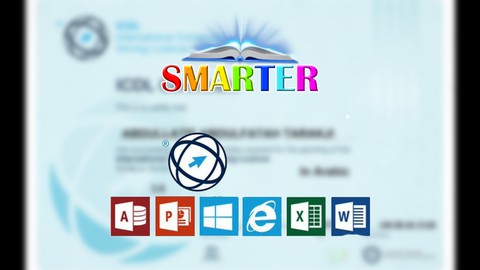International Computer Driving License (ICDL)

Description
International Computer Driving License (ICDL)
European Computer Driving Licence (ECDL)
The International Computer Driving License (ICDL) is the world’s leading end-user computer skills certification program. It is intended for those who wish to acquire IT knowledge and skills in compliance with international standards.
International Computer Driving License (ICDL) currently has millions of active students. We offer a comprehensive course which fully covers every single ICDL learning outcome with Highly interactive and engaging content.
We are also offering a Condensed course, free Material for the seven modules, so that you can get a real feel of our teaching style.
The 7 ICDL modules are as follows :
Module 1Basic Concepts of Information TechnologyModule 2Using a Computer and Managing FilesModule 3Word ProcessingModule 4SpreadsheetsModule 5DatabasesModule 6PresentationModule 7Information and Communication
European Computer Driving Licence (ECDL), also known as International Computer Driving Licence (ICDL) in non-European countries, is a computer literacy certification programme provided by ECDL Foundation, a not-for-profit organisation.
ECDL / ICDL certification – is a globally recognised information and communication technology (ICT) and digital literacy qualification.Other than the name, there is no difference between ECDL and ICDL and they are recognised as equivalent. According to ECDL Foundation, over 14 million people in over 100 countries had registered as candidates for ECDL.
In 1995, the ECDL certification programme was developed through a task force of the Council of European Professional Informatics Societies (CEPIS) and was recommended by the European Commission High Level Group, ESDIS, to be a Europe-wide certification scheme.The task force compared several national certification schemes and chose the CDL from Finland as the basis for piloting and later adoption into the ECDL.
In the UK, it is used by the National Health Service as the benchmark IT qualification and as such it is available without charge to all staff.
Testing
In order to take the tests, a candidate buys an ECDL Skills Card, which usually is issued electronically and serves as a login to the testing platform. To prepare for a module test, the candidate may use ECDL diagnostic tests. Testing is done using software which simulates the Windows/Microsoft Office environment. The candidate’s mouse movements and keystrokes are monitored and the result of the test is reported immediately after the test is completed.
New ECDL / ICDL[edit]
Since 2013, the syllabus has been divided into 18 modules on three levels:
- Base Modules
- Computer Essentials
- Online Essentials
- Word Processing
- Spreadsheets
- Theory
- Intermediate Modules
- Presentation
- Using Databases
- IT Security
- Online Collaboration
- Image Editing
- Web Editing
- Project Planning
- 2D Computer Aided Design
- Health Information Systems Usage
- ICT in Education
- Digital Marketing
- Advanced Modules
- Advanced Word Processing
- Advanced Spreadsheets
- Advanced Database
- Advanced Presentation
Original ECDL / ICDL[edit]
Until 2021 the ECDL/ICDL syllabus was divided into seven modules. These are:
- Security for IT Users
- IT User Fundamentals (Windows Explorer in Windows 10)
- Word processing (Microsoft Word 2019)
- Spreadsheets (Microsoft Excel 2019)
- Databases (Microsoft Access 2019)
- Presentations (Microsoft PowerPoint 2019)
- Using Email and the Internet (Windows Explorer in Windows 10)
Additionally, there was an Advanced version that was divided into four modules. These are:
- Advanced Word Processing
- Advanced Spreadsheets
- Advanced Presentation
- Advanced Database
Many training centres used Microsoft software (the applications used are shown in parenthesis) but other software environments could be used, such as Apache OpenOffice/LibreOffice.
Who this course is for:
- Students
- Teacher
- Computer users
- Kids






